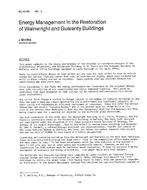Click here to purchase
Fresh air enters a building through its air intake. Likewise, building exhausts remove air contaminants from a building so wind can dilute the emissions. If the intake or exhaust system is not well designed, contaminants from nearby outside sources (e.g., vehicle exhaust, emergency generator, laboratory fume hoods on nearby buildings) or from the building itself (e.g., laboratory fume hood exhaust) can enter the building with insufficient dilution. Poorly diluted contaminants may cause odors, health impacts, and reduced indoor air quality. This chapter discusses proper design of exhaust stacks and placement of air intakes to avoid adverse air quality impacts. Chapter 24 of the 2017 ASHRAE Handbook—Fundamentals more fully describes wind and airflow patterns around buildings. Related information can also be found in Chapters 9, 18, 33, 34, and 35 of this volume, Chapters 11 and 12 of the 2017 ASHRAE Handbook—Fundamentals, and Chapters 29, 30, and 35 of the 2016 ASHRAE Handbook—HVAC Systems and Equipment.
Exhaust Stack and Air Intake Design Strategies
Geometric Method for Estimating Stack Height
Exhaust-To-Intake Dilution or Concentration Calculations
Other Considerations
No. of Pages: 13
Citation: 2019 ASHRAE Handbook¿¿¿HVAC Applications
Product Details
- Published:
- 2019
- ISBN(s):
- 9781947192126
- Number of Pages:
- 13
- Units of Measure:
- Dual
- File Size:
- 1 file , 370 KB
- Product Code(s):
- D-A462019IP


